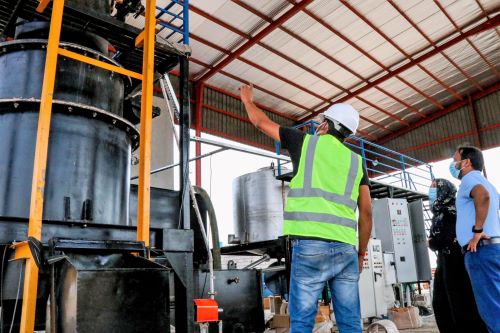Biofuels collectively benefiting the environment but India needs new momentum: Industry
The biofuels industry in India, encompassing ethanol, CBG, biomass and beyond, is pivotal in combating climate change and improving the natural environment. The young entrepreneurs of the industry believe that it’s crucial to understand the persisting challenges and employ collective prowess to navigate to a brighter future.

As the world just observed the World Environment Day in the first week of this month, a peek into the biofuels industry in India is unavoidable for reasons certainly more than one. The ethanol, CBG or biomass segments are not just reducing our dependence on imported fossil fuels to save on precious money reserves, but have become strong catalyst to address climate change and pollution issues. The industry has come a long way, and the dynamic entrepreneurs in the industry are best advocates on how a changing biofuel industry is shaping up the environmental consciousness in the country.
As India strives for a cleaner, self-reliant energy future, the biofuels industry plays a vital role today in achieving sustainable development goals and ensuring a greener, more resilient economy.
‘Increased R&D into organic waste will further bolster biofuels sector ‘

Mumbai based Organic Recycling Systems (ORS) CEO Yashas Bhand says that the bioenergy will play an important role in substituting the hydrocarbons and achieving the ‘net zero’ goal. “Biofuels come from a source that is discarded and with the increase of population, the organic waste will always be available which is renewable itself.”
Yashas says, “The organic fraction of MSW is contributing to climate change. MSW is dumped in sanitary landfills which have become major hotspots of methane generation. Biofuels sector offer a direct solution to mitigate this methane generation in India.”
He finds the biofuels situation very positive in terms of the policies that have come across, growth is great and funds are available. But he also sees challenges that need to overcome in two aspects. He mentions, “One is that the feedstock availability has to be ensured– whether agro-based or organic faction of MSW. In short term, agro based aggregation and MSW segregation are challenges when speaking about biogas.”
“Second challenge is with regards to the offtake of the products that are coming out of plants like compost or fermented organic manure. Even if we don’t agree with it, we do compete with fertilizers because fertilizer production is high and so are subsidies on them. The farmers also require yield. But the good thing is that they have begun to understand that even the soil health is also important. Hence, there is a need for a parallel market infrastructure from the government side to solve this issue,” said Yashas.
He also held that there are certain areas that remain largely untapped. “One is CO2 capture during the purification system in the biogas production. Second is there is potential in terms of R&D because not all organic waste goes to the production of ethanol or biogas. We have done some research where one or two biomass needs to be converted into activated carbon because of certain parameters.”
He said that ORS is contributing by developing different technologies for converting specific organic fractions or biomass waste into other than existing usable products. ORS has its own R&D facilities and has also tied up with top institutions where joint research and specific analysis is carried out.
ORS has been managing waste and producing biogas for the past 15 years has evolved from mere EPC to a technology driven engineering company. “EPC is not a rocket science, one of the most important thing in biogas industry is ‘maintenance.’ The challenge lies in monitoring and managing the biofuel plants because the organic content & parameters keep on changing. The industry lacks in skilled workforce and we are just building that by offering the data-bank that we have built over the last 15 years. We share it with other project developers for the benefit of the biofuels industry.”
‘Biofuels good for nature & also drive infrastructure development’

Atul Saxena, CEO of Grow Diesel Ventures, argues that biofuels not only lowers greenhouse gas emissions and also advances sustainable agriculture methods. With major developments and investments resulting in higher output and efficiency, the biofuels sector has advanced past its early stages.
Atul Saxena mentions, “The industry has the ability to greatly contribute to meeting global energy needs while reducing its negative environmental effects, as seen by its continuous expansion and maturation in spite of these obstacles.”
Grow Diesel Ventures is revolutionizing the biofuels industry with its patented technologies for crude gas and refined biogas. “By focusing on waste elimination and biofuel generation, the company is not only addressing pressing environmental concerns but also driving significant societal and economic benefits. This approach not only mitigates environmental pollution but also contributes to the development of a renewable energy infrastructure, fostering a cleaner and more sustainable future for the generations to come,” said Saxena.
He says that some areas needs immediate attention. “Waste-to-energy conversion is one of these areas, as are making the most of plentiful non-food biomass resources, investigating the potential of algae as a source of biofuels, investing in cutting-edge biofuel technologies, putting supportive laws and incentives in place, incorporating the production of biofuel into rural development programs, and encouraging public-private partnerships.” He said that India can fully utilize biofuels to improve energy security, lessen their impact on the environment, generate jobs, and encourage inclusive economic growth by concentrating on these areas and putting specific plans into place.
He also added that the biofuels industry needs to tackle some tough challenges. “First, we’ve got to figure out how to make biofuel production cheaper and more efficient. Then there’s the issue of finding sustainable sources of feedstock without messing up food supplies or natural habitats. We’ve also got to deal with the fact that biofuels can sometimes be less powerful than regular fuels, so we need to improve their performance.”
“And let’s not forget about the infrastructure – we need more biofuel pumps and vehicles that can run on biofuels. Lastly, we’ve got to make sure that making biofuels doesn’t end up using more energy than they actually produce. If we can crack these problems, biofuels could really take off,” apprises Saxena.
He believes that India holds a wealth of untapped opportunities when it comes to biofuels. “Embracing biofuels could not only drive environmental conservation but also unlock new avenues for economic growth and energy security in India.”
‘Technological advancements are crucial to overcome challenges’

Coming with two decades of experience, Arka BRENStech CEO Srinivas Kasulla calls biofuels as a ‘double-edged sword.’ He says that biofuels possess the capacity to serve as an effective instrument in safeguarding the natural environment, although their influence is contingent upon the manner in which they are manufactured and utilized.
“Biofuels have the potential to greatly decrease greenhouse gas emissions as they are made from sustainable feedstocks and processed effectively. Biofuels are renewables while the fossil fuels that are limited in quantity.”
He cautions about certain challenges that may mar the biofuels story in India. “We need to ward off the challenges that may associate with the biofuels development in India. For example, the land-use change resulting from the extensive production of biofuels might cause deforestation and the transformation of natural ecosystems that would undermine the positive environmental outcomes.”
Other thing being that cultivating crops for biofuels can need a significant amount of water which can place a burden on freshwater supplies in some areas of India.
Srinivas believes that the ‘Food vs. Fuel Debate’ revolves around the possible competition between biofuel production and food production due to the increased usage of land for biofuels. This competition has the potential to negatively affect food security.
Srinivas says goes ahead to say that exploring the use of non-food crops, waste materials, and algae shows great potential. “Technological advancements are crucial in developing efficient and cost-effective manufacturing methods for advanced biofuels. The government policies must address challenges related to sustainability and technological limits.”
Arka BRENStech is contributing to the biofuels industry by optimizing biogas production. As a leading biogas plant Project Management Consultancy (PMC) and Engineering, Procurement, and Construction (EPC) provider, Arka BRENStech allows plants to integrate advanced laboratory testing instruments specifically designed for anaerobic digestion processes. The CEO holds that processes that give lower biogas yields are not optimal with regards to environment.
According to Srinivas, there are some key areas that need immediate focus to unlock the full potential of biogas. Technological advancements is one of them. “The focus should be on advanced biofuels exploring advanced biofuels like cellulosic ethanol and biodiesel derived from algae can offer even higher energy density and reduced land-use impact. Partnering with research institutions or exploring technology transfer opportunities can position Arka BRENStech at the forefront of these advancements.”
He says that certain challenges should be immediately overcome. For example, the negative perceptions among the people about potential land-use change or environmental impact of biofuels need to be addressed through education and promoting success stories of sustainable biofuel projects.
“The transition to biofuels needs to be managed carefully to avoid negative impacts on rural communities and livelihoods.”




